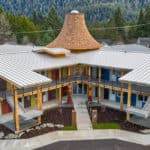One specific partnership with Alberta Environment and Parks and Environment and Climate Change Canada, the Freshwater Clam Study, has led to reflection on how “learning together” is essential to the collection of relevant information about the state of freshwater mussels (locally knows as clams) in the Lower Athabasca Region. This community-based participatory research (CBPR), braided with Indigenous Knowledge, has been used as a guiding framework to facilitate partnerships and create safe, ethical spaces across diverse knowledge systems to address questions about freshwater mussel health in a locally relevant and culturally appropriate way. This framework of “learning together” in the Clam Study shows that complex problems, such as cumulative effects studies, can be understood in ways that are more meaningful and insightful than they would be if Indigenous communities, government scientists, or research consultants studied them alone (Hopkins et al. 2019). The Clam Team is now in the process of co-analysing the clam tissue, sediment and water contaminant data in the Clearwater and Athabasca rivers with the aim of completing a co-authored publically available peer-reviewed manuscript before the middle of 2021. Through the co-design of the project combined with shared experiences on the land, data collection, and interpretation, the goal is to co-produce knowledge about environmental change in the oil sands region, based on Indigenous knowledge and scientific information.
The McMurray Métis also conducts traditional land use mapping (TLU) research and cultural impact assessments (CIA) in order to assert Métis rights, and work with and negotiate with industry partners and government regarding effects of oil sands projects. In general, TLU studies and impact assessments are often conducted on a project-by-project basis and in what has been called a “silo model”, which obscures the cumulative effects by analysing one specific component of one project at a time. To better represent the actual lived experience of members on the land, who face stressors from multiple industries and development activities, McMurray Métis have developed a living, community-based methodology which assesses the cumulative effect of projects on McMurray Métis culture and way of life. Community members often speak of the inherent interconnectedness of culture, environment, and economy, and of the need to consider the assessment of project impacts over a long temporal period. To include this holistic view in their impact assessments, McMurray Métis developed the concept of “Métis space” which relates to the physical and social places that are required for the maintenance and renewal of Métis ways of life. Proposed and realized projects are assessed with respect to their (potential) impacts on Métis space, and community-identified components of Métis culture related to that space (Clark and McMurray Métis 2017).
Sources:
Hopkins, Debra, Tara L. Joly, Harvey Sykes, Almer Waniandy, John Grant, Lorrie Gallagher, Leonard Hansen, Kaitlyn Wall, Peter Fortna, and Michelle Bailey. 2019. “‘Learning Together’: Braiding Indigenous and Western Knowledge Systems to Understand Freshwater Mussel Health in the Lower Athabasca Region of Alberta, Canada.” Journal of Ethnobiology 39 (2): 315–36.
Clark, Timothy David, and McMurray Métis. 2017. “McMurray Métis Cultural Impact Assessment of the Suncor Voyageur South Project.” Fort McMurray, AB: Prepared by Willow Springs Strategic Solutions for Fort McMurray Métis Local 1935.
View Source





